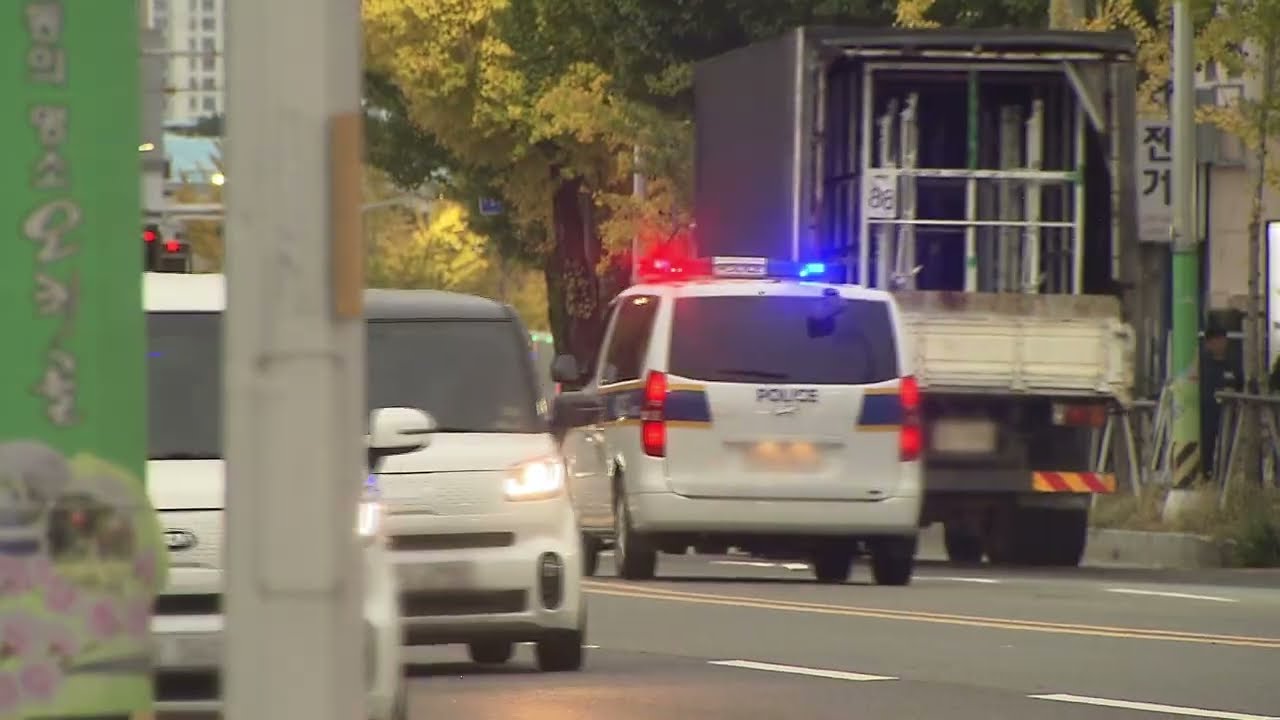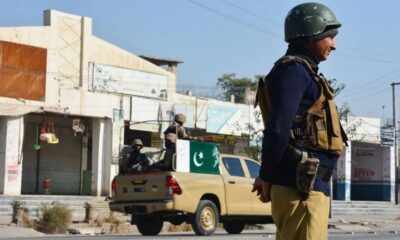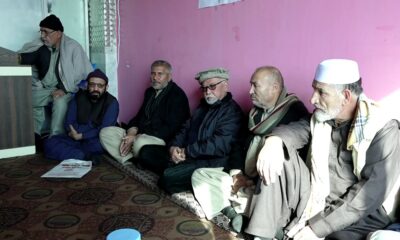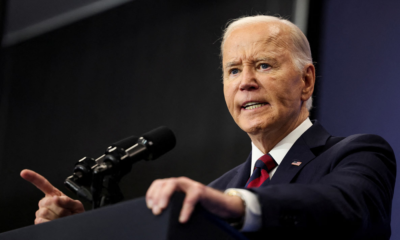Science & Technology
N.Korea fires salvo of missiles, including ICBM, hours after Biden leaves Asia

North Korea fired three missiles, including one thought to be an intercontinental ballistic missile (ICBM) on Wednesday, after U.S. President Joe Biden left Asia following a trip in which he agreed to new measures to deter the nuclear-armed state.
South Korea's Joint Chiefs of Staff (JCS) said the three missiles were fired in less than an hour from the Sunan area of the North's capital, Pyongyang, where its international airport has become a hub of missile tests.
The first missile launched on Wednesday appeared to be an ICBM, while a second unidentified missile appears to have failed mid-flight, the JCS said. The third missile was a short-range ballistic missile (SRBM), it said.
In response, the United States and South Korea held combined live-fire drills, including surface-to-surface missile tests involving the Army Tactical Missile System (ATACMS) of the U.S. and the South's Hyunmoo-2 SRBM, both militaries said.
"Our military's show of force was intended to highlight our resolve to firmly respond to any North Korean provocations, including an ICBM launch, and our overwhelming capability and readiness to conduct a surgical strike on the origin of the provocation," the JCS said in a statement.
North Korea has conducted a flurry of missile launches this year, from hypersonic weapons to test firing its largest ICBMs for the first time in nearly five years. It also appears to be preparing for what would be its first nuclear test since 2017.
U.S. and South Korean officials had recently warned that North Korea appeared ready for another weapons test, possibly during Biden's visit, which was his first trip to Asia as president and included a summit with South Korean President Yoon Suk-yeol in Seoul.
Yoon, who took office on May 10, convened his first meeting of the national security council, which strongly condemned the latest launch as a "grave provocation", especially as it came before Biden returned home.
Yoon ordered the aides to strengthen the U.S. extended deterrence and combined defence posture as agreed with Biden, his office said.
"North Korea's continued provocations will only result in even stronger, faster South Korea-U.S. deterrence, and bring deeper isolation upon itself," Yoon's government said in a separate statement.
A White House official said that Biden, who departed Japan on Tuesday evening, had been briefed on the launches and would continue to receive updates.
South Korean Foreign Minister Park Jin and U.S. Secretary of State Antony Blinken also agreed to step up diplomatic efforts to reinforce extended deterrence and facilitate a new U.N. sanctions resolution in a phone call, Seoul's ministry said.
"We call on the DPRK to refrain from further provocations and engage in sustained and substantive dialogue," a State Department spokesperson said, using the initials of North Korea's official name.
SHOW OF FORCE
Pyongyang resumed ICBM testing in late March, ending its self-imposed 2017 moratorium on long-range missile and nuclear testing, amid stalled denuclearisation talks with Washington.
In Wednesday's test, the suspected ICBM flew 360 km (223.7 miles) to a maximum altitude of 540 km, while the SRBM flew 760 km to a maximum altitude of 60 km, the JCS said.
Japan reported at least two launches, one of which flew about 300 km and reached a maximum altitude of 550 km, and the other to the distance of about 750 km (465 miles) and a maximum altitude of 50 km, Japan's defence minister said.
Japanese broadcaster NHK said the missiles appeared to have fallen outside Japan's exclusive economic zone (EEZ).
Japanese chief cabinet secretary Hirokazu Matsuno said the North could take more provocative actions, including a nuclear test.
The U.S. military's Indo-Pacific Command said it was aware of "multiple" launches. They highlighted the "destabilising impact of the DPRK's illicit weapons programme" but did not pose an immediate threat.
In Seoul over the weekend, Biden and Yoon agreed to hold bigger military drills and deploy more U.S. strategic assets if necessary to deter North Korea's intensifying weapons tests.
But they also offered to send COVID-19 vaccines to North Korea as the isolated country battles its first confirmed outbreak, and called on Pyongyang to return to diplomacy.
There had been no response from Pyongyang to the diplomatic overtures or offers of aid, Biden said at the time.
The waning hours of Biden's visit to the region also saw Russian and Chinese bombers flying joint patrols near Japanese and South Korea air defence zones on Tuesday in a pointed farewell.
Science & Technology
Australia’s under-16 social media ban sparks anger and relief

Australians reacted on Friday with a mixture of anger and relief to a social media ban on children under 16 that the government says is world-leading, but which tech giants like TikTok argue could push young people to "darker corners of the internet".
Australia approved the social media ban for children late on Thursday after an emotive debate that has gripped the nation, setting a benchmark for jurisdictions around the world with one of the toughest regulations targeting Big Tech, Reuters reported.
The law forces tech giants from Instagram and Facebook owner Meta Platforms to TikTok to stop minors from logging in or face fines of up to A$49.5 million ($32 million). A trial of enforcement methods will start in January, with the ban to take effect in a year.
"Platforms now have a social responsibility to ensure the safety of our kids is a priority for them," Australian Prime Minister Anthony Albanese said on Friday
"We're making sure that mums and dads can have that different conversation today and in future days."
Announcing the details of the ban earlier this month, Albanese cited the risks to physical and mental health of children from excessive social media use, in particular the risks to girls from harmful depictions of body image, and misogynist content aimed at boys.
In Sydney on Friday, reaction to the ban was mixed.
"I think that's a great idea, because I found that the social media for kids (is) not really appropriate, sometimes they can look at something they shouldn't," said Sydney resident Francesca Sambas.
Others were more scathing.
"I'm feeling very angry, I feel that this government has taken democracy and thrown it out the window," said 58-year-old Shon Klose.
"How could they possibly make up these rules and these laws and push it upon the people?"
Children, meanwhile, said they would try to find a way around the ban.
"I feel like I still will use it, just secretly get in," said 11-year-old Emma Wakefield.
WORLD FIRST
Countries including France and some U.S. states have passed laws to restrict access for minors without a parent's permission, but the Australian ban is absolute. A full under-14s ban in Florida is being challenged in court on free speech grounds.
Albanese's Labor party won crucial support from the opposition conservatives for the bill that was fast-tracked through the country's parliament as part of 31 bills pushed through in a chaotic final day of parliament for the year.
The government has said enough notice was given as it first flagged the ban after a parliamentary inquiry earlier this year that heard testimony from parents of children who had self-harmed due to cyber bullying.
But it was criticised by social media firms and some lawmakers who say the bill has lacked proper scrutiny.
A spokesperson for TikTok, which is hugely popular with teen users, said on Friday the process had been rushed and risked putting children into greater danger.
"We're disappointed the Australian government has ignored the advice of the many mental health, online safety, and youth advocacy experts who have strongly opposed the ban," the spokesperson said.
Albanese said on Friday passing the bill before the age verification trial has been completed was the correct approach.
"We've got your back is our message to Australian parents," Albanese said.
"We don't argue that its implementation will be perfect, just like the alcohol ban for under 18s doesn't mean that someone under 18 never has access, but we know that it's the right thing to do."
The ban could strain Australia's relationship with key ally the United States, where X owner Elon Musk, a central figure in the administration of president-elect Donald Trump, said in a post this month it seemed a "backdoor way to control access to the Internet by all Australians".
It also builds on an existing mood of antagonism between Australia and mostly US-domiciled tech giants. Australia was the first country to make social media platforms pay media outlets royalties for sharing their content and now plans to threaten them with fines for failing to stamp out scams.
Science & Technology
South Korea authorities launch probe after three die in Hyundai car test
The Ulsan plant is Hyundai’s biggest manufacturing facility, with its own port and an annual production capacity of 1.4 million vehicles

South Korean authorities launched an investigation on Tuesday after three people died during a car test at a Hyundai Motor plant in the city of Ulsan, police told Reuters.
The two Hyundai researchers and one Hyundai contractor were found unconscious in a car at around 3:00 p.m. while they were testing it in a "chamber," according to Hyundai's labour union.
South Korean media reports said the three had suffocated.
A police officer in Ulsan said the police and the labour ministry were investigating the incident, including its cause.
A fire department official told Reuters that it first received a report at 3:17 pm that the accident happened at Hyundai's No.4 factory.
"Hyundai Motor Company is deeply saddened by the incident that occurred at our plant in Ulsan, South Korea," Hyundai said in a statement, saying it would "cooperate fully with all relevant authorities to determine the cause of this incident."
The Ulsan plant is Hyundai's biggest manufacturing facility, with its own port and an annual production capacity of 1.4 million vehicles, including exports of 1.1 million units.
In November last year, Hyundai Motor broke ground on a 2 trillion won ($1.44 billion) plant in Ulsan dedicated to making electric vehicles in South Korea, as the automaker accelerated a shift away from petrol-powered cars.
[embed]https://youtu.be/KrLKCrpLALU[/embed]
Science & Technology
Russia fines Google more than the world’s total GDP over YouTube bans

Russia has fined Google $2.5 decillion after the US tech giant took action against pro-Kremlin TV channels on YouTube following Moscow’s invasion of Ukraine.
Russia imposed a daily fine four years ago - a fine that has since swelled to an unprecedented level - ($20,000,000,000,000,000,000,000,000,000,000,000 - a 33-digit figure).
To put this into perspective, global GDP reaches an estimated $110 thousand billion (12-digit figure), according to the IMF.
Speaking to Russia’s TASS news agency, one expert, Roman Yankovsky from the HSE Institute of Education, said Google “clearly will not pay this penalty, and the Russian Federation will not be able to recover this money from the company."
Euronews reported that a short calculation shows that he is right.
Google's holding company, Alphabet, has a market capitalisation of slightly more than $2 trillion. Even with earnings of $80.54 billion from the last quarter, the tech giant doesn’t seem to be able to afford to pay the fine.
Google first barred pro-Moscow channel Tsargrad TV, which is owned by oligarch Konstantin Malofeev, four years ago.
At the time, Google was fined a daily penalty of 100,000 roubles and warned that amount would double every 24 hours if it went unpaid.
The original fine has been compounded by further penalties after Google eventually blocked a total of 17 Russian TV channels as a result of international sanctions, The Telegraph reported.
The tech giant now owes a staggering $2.5 decillion.
-

 International Sports5 days ago
International Sports5 days agoWinners of The Best FIFA Football Awards 2024 to be revealed Dec. 17
-

 Regional4 days ago
Regional4 days agoBomb kills chief of Russian nuclear protection forces in Moscow
-

 Sport4 days ago
Sport4 days agoATN once again seals deal to broadcast upcoming IPL across Afghanistan
-

 Sport4 days ago
Sport4 days agoLanka T10: All three matches abandoned due to rain
-

 World4 days ago
World4 days agoAt least 100,000 bodies in Syrian mass grave, US advocacy group head says
-

 Latest News4 days ago
Latest News4 days agoIndia hoping to import coal and marble from Afghanistan
-

 Latest News4 days ago
Latest News4 days agoTrump says he would have pulled out of Afghanistan with ‘dignity and strength’
-

 Sport3 days ago
Sport3 days agoZimbabwe’s opening ODI against Afghanistan abandoned
























